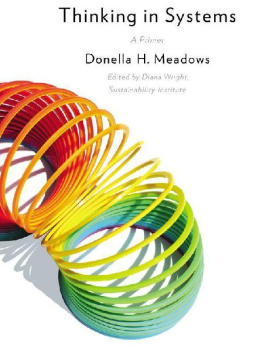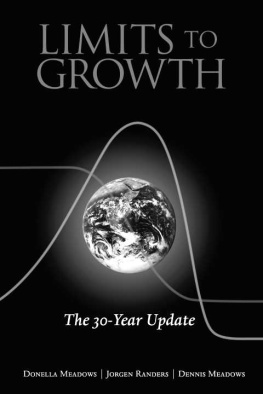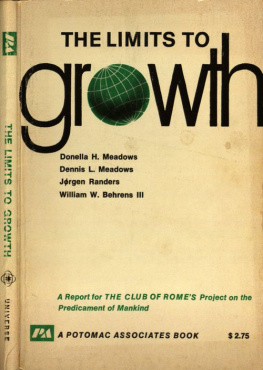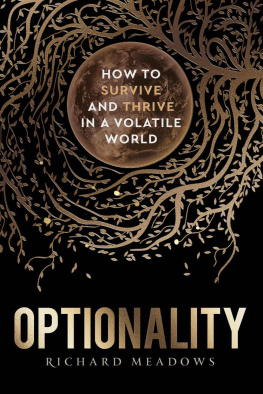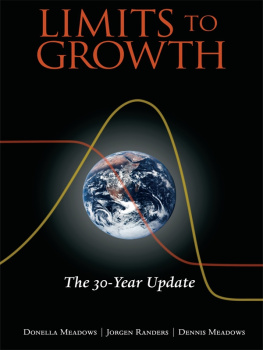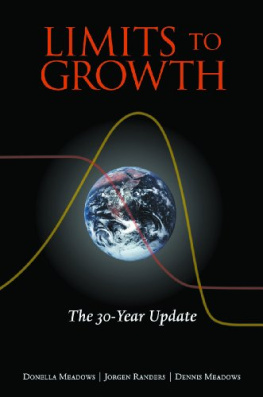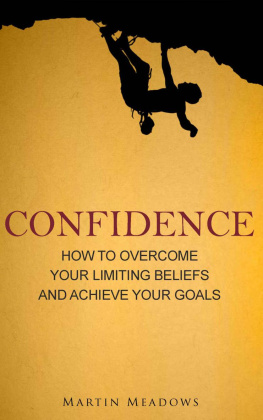Donella H. Meadows - Thinking in Systems: A Primer
Here you can read online Donella H. Meadows - Thinking in Systems: A Primer full text of the book (entire story) in english for free. Download pdf and epub, get meaning, cover and reviews about this ebook. year: 2008, publisher: Chelsea Green Publishing, genre: Politics. Description of the work, (preface) as well as reviews are available. Best literature library LitArk.com created for fans of good reading and offers a wide selection of genres:
Romance novel
Science fiction
Adventure
Detective
Science
History
Home and family
Prose
Art
Politics
Computer
Non-fiction
Religion
Business
Children
Humor
Choose a favorite category and find really read worthwhile books. Enjoy immersion in the world of imagination, feel the emotions of the characters or learn something new for yourself, make an fascinating discovery.
- Book:Thinking in Systems: A Primer
- Author:
- Publisher:Chelsea Green Publishing
- Genre:
- Year:2008
- Rating:4 / 5
- Favourites:Add to favourites
- Your mark:
- 80
- 1
- 2
- 3
- 4
- 5
Thinking in Systems: A Primer: summary, description and annotation
We offer to read an annotation, description, summary or preface (depends on what the author of the book "Thinking in Systems: A Primer" wrote himself). If you haven't found the necessary information about the book — write in the comments, we will try to find it.
Thinking in Systems: A Primer — read online for free the complete book (whole text) full work
Below is the text of the book, divided by pages. System saving the place of the last page read, allows you to conveniently read the book "Thinking in Systems: A Primer" online for free, without having to search again every time where you left off. Put a bookmark, and you can go to the page where you finished reading at any time.
Font size:
Interval:
Bookmark:
Thinking in Systems
O THER B OOKSBY D ONELLA H. M EADOWS :
Harvesting One Hundredfold: Key Concepts and Case Studies in Environmental Education (1989). The Global Citizen (1991).
WITH D ENNIS M EADOWS :
Toward Global Equilibrium (1973).
WITH D ENNIS M EADOWS AND J RGEN R ANDERS :
Beyond the Limits (1992).
Limits to Growth: The 30-Year Update (2004).
WITH D ENNIS M EADOWS , J RGEN R ANDERS , AND W ILLIAM W. B EHRENS III:
The Limits to Growth (1972).
WITH D ENNIS M EADOWS , ET AL .:
The Dynamics of Growth in a Finite World (1974).
WITH J. R ICHARDSON AND G. B RUCKMANN :
Groping in the Dark: The First Decade of Global Modeling (1982).
WITH J. R OBINSON :
The Electronic Oracle: Computer Models and Social Decisions (1985).
Thinking in Systems
A Primer
Donella H. Meadows
Edited by Diana Wright, Sustainability Institute
CHELSEA GREEN PUBLISHING
WHITE RIVER JUNCTION, VERMONT
Copyright 2008 by Sustainability Institute. All rights reserved.
No part of this book may be transmitted or reproduced in any form by any means without permission in writing from the publisher.
Project Manager: Emily Foote
Developmental Editor: Joni Praded
Copy Editor: Cannon Labrie
Proofreader: Ellen Brownstein
Indexer: Beth Nauman-Montana
Designer: Peter Holm, Sterling Hill Productions
Printed in the United States of America
First printing, December, 2008
10 9 8 7 6 5 4 3 2 09 10 11 12
Chelsea Green sees publishing as a tool for cultural change and ecological stewardship. We strive to align our book manufacturing practices with our editorial mission and to reduce the impact of our business enterprise in the environment. We print our books and catalogs on chlorine-free recycled paper, using soy-based inks whenever possible. This book may cost slightly more because we use recycled paper, and we hope youll agree that its worth it. Chelsea Green is a member of the Green Press Initiative ( www.greenpressinitiative.org ), a nonprofit coalition of publishers, manufacturers, and authors working to protect the worlds endangered forests and conserve natural resources. Thinking in Systems was printed on 55-lb. Natures Book Natural, a 30-percent postconsumer-waste, FSC-certified, recycled paper supplied by Thomson-Shore.
Library of Congress Cataloging-in-Publication Data
Meadows, Donella H.
Thinking in systems : a primer / Donella H. Meadows ; edited by Diana Wright.
p. cm.
Includes bibliographical references.
eBook ISBN: 978-1-6035-8148-6
1. System analysis--Simulation methods 2. Decision making--Simulation methods 3. Critical thinking--Simulation methods 4. Sustainable development--Simulation methods. 5. Social sciences-Simulation methods. 6. Economic development--Environmental aspects--Simulation methods. 7. Population--Economic aspects--Simulation methods. 8. Pollution--Economic aspects--Simulation methods. 9. Environmental education--Simulation methods. I. Wright, Diana. II. Title.
QA402.M425 2008
003--dc22
2008035211
Chelsea Green Publishing Company
Post Office Box 428
White River Junction, VT 05001
(802) 295-6300 www.chelseagreen.com
Part of this work has been adapted from an article originally published under the title Whole Earth Models and Systems in Coevolution Quarterly (Summer 1982). An early version of Chapter 6 appeared as Places to Intervene in a System in Whole Earth Review (Winter 1997) and later as an expanded paper published by the Sustainability Institute. Chapter 7, Living in a World of Systems, was originally published as Dancing with Systems in Whole Earth Review (Winter 2001).
FOR DANA
(19412001)
and for all those who would learn from her
Contents
This book has been distilled out of the wisdom of thirty years of systems modeling and teaching carried out by dozens of creative people, most of them originally based at or influenced by the MIT System Dynamics group. Foremost among them is Jay Forrester, the founder of the group. My particular teachers (and students who have become my teachers) have been, in addition to Jay: Ed Roberts, Jack Pugh, Dennis Meadows, Hartmut Bossel, Barry Richmond, Peter Senge, John Sterman, and Peter Allen, but I have drawn here from the language, ideas, examples, quotes, books, and lore of a large intellectual community. I express my admiration and gratitude to all its members.
I also have drawn from thinkers in a variety of disciplines, who, as far as I know, never used a computer to simulate a system, but who are natural systems thinkers. They include Gregory Bateson, Kenneth Boulding, Herman Daly, Albert Einstein, Garrett Hardin, Vclav Havel, Lewis Mumford, Gunnar Myrdal, E.F. Schumacher, a number of modern corporate executives, and many anonymous sources of ancient wisdom, from Native Americans to the Sufis of the Middle East. Strange bedfellows, but systems thinking transcends disciplines and cultures and, when it is done right, it overarches history as well.
Having spoken of transcendence, I need to acknowledge factionalism as well. Systems analysts use overarching concepts, but they have entirely human personalities, which means that they have formed many fractious schools of systems thought. I have used the language and symbols of system dynamics here, the school in which I was taught. And I present only the core of systems theory here, not the leading edge. I dont deal with the most abstract theories and am interested in analysis only when I can see how it helps solve real problems. When the abstract end of systems theory does that, which I believe it will some day, another book will have to be written.
Therefore, you should be warned that this book, like all books, is biased and incomplete. There is much, much more to systems thinking than is presented here, for you to discover if you are interested. One of my purposes is to make you interested. Another of my purposes, the main one, is to give you a basic ability to understand and to deal with complex systems, even if your formal systems training begins and ends with this book.
D ONELLA M EADOWS , 1993
In 1993, Donella (Dana) Meadows completed a draft of the book you now hold. The manuscript was not published at the time, but circulated informally for years. Dana died quite unexpectedly in 2001before she completed this book. In the years since her death, it became clear that her writings have continued to be useful to a wide range of readers. Dana was a scientist and writer, and one of the best communicators in the world of systems modeling.
In 1972, Dana was lead author of The Limits to Growth a best-selling and widely translated book. The cautions she and her fellow authors issued then are recognized today as the most accurate warnings of how unsustainable patterns could, if unchecked, wreak havoc across the globe. That book made headlines around the world for its observations that continual growth in population and consumption could severely damage the ecosystems and social systems that support life on earth, and that a drive for limitless economic growth could eventually disrupt many local, regional, and global systems. The findings in that book and its updates are, once again, making front-page news as we reach peak oil, face the realities of climate change, and watch a world of 6.6 billion people deal with the devastating consequences of physical growth.
In short, Dana helped usher in the notion that we have to make a major shift in the way we view the world and its systems in order to correct our course. Today, it is widely accepted that systems thinking is a critical tool in addressing the many environmental, political, social, and economic challenges we face around the world. Systems, big or small, can behave in similar ways, and understanding those ways is perhaps our best hope for making lasting change on many levels. Dana was writing this book to bring that concept to a wider audience, and that is why I and my colleagues at the Sustainability Institute decided it was time to publish her manuscript posthumously.
Next pageFont size:
Interval:
Bookmark:
Similar books «Thinking in Systems: A Primer»
Look at similar books to Thinking in Systems: A Primer. We have selected literature similar in name and meaning in the hope of providing readers with more options to find new, interesting, not yet read works.
Discussion, reviews of the book Thinking in Systems: A Primer and just readers' own opinions. Leave your comments, write what you think about the work, its meaning or the main characters. Specify what exactly you liked and what you didn't like, and why you think so.

